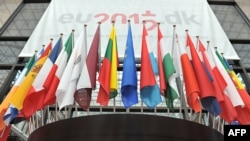European Union leaders meeting at a summit in Brussels Thursday have agreed to set aside about $150 billion to stimulate growth in the bloc's weakest economies.
European Council President Herman van Rompuy announced the so-called "growth pact" which was rejected by Italy and Spain.
"The key element is that we boost the financing of the economy by mobilizing around 120 billion euros (close to $150 billion ) for immediate growth matters," said van Rompuy. "A 10-billion-euro increase of the capital of European investment banks will increase the banks' overall lending capacity by 60 billion and this money must flow across Europe, not least to the most vulnerable countries and help companies grow themselves out of the crisis.''
Italy and Spain say their borrowing costs are too high and they are seeking short-term measures to ease market pressure. The discussion will continue Friday.
Both Rome and Madrid, with the eurozone's third and fourth largest economies, have watched in recent days as the interest rates on their loans have soared to near the 7 percent level. That is the mark at which much smaller economies Greece, Ireland and Portugal were forced to secure international bailouts in the last two years.
If Italy and Spain used the eurozone's bailout fund for their debt sales, it could cut their borrowing costs because they no longer would be subject to the whims of speculators on world markets.
Spanish Prime Minister Mariano Rajoy warned this week that his government will not be able to sustain its high borrowing costs for much longer. He won support from French President Francois Hollande, who said as he arrived at the summit that he was looking for "very quick solutions" to support Italy and Spain.
Efforts to ease the plight of Italy and Spain overtook the initial summit focus on Germany, which has the currency bloc's most robust economy.
Some European leaders are advocating the sale of eurobonds, debt supported by the entire 17-nation eurozone, not just individual governments. But Berlin has opposed their adoption, fearing that its borrowing costs could jump even as those for weaker governments drop.
German Chancellor Angela Merkel this week called eurobonds "economically wrong and counterproductive." But finance minister Wolfgang Schaeuble signaled Germany may be shifting in its adamant opposition.
He told a U.S. business publication, The Wall Street Journal, that Germany could agree to some form of shared eurozone debt if it is convinced that the move toward central European control over the spending practices of the eurozone's individual governments is "irreversible and well-coordinated." He said there would be no common bonds "without a common fiscal policy."
The new $150 billion package to boost the eurozone's stagnant economy amounts to about 1 percent of the eurozone economy, but the effect of the spending is uncertain because most of the money had already been earmarked for development projects.
Some information for this report was provided by AP, AFP and Reuters.
European Council President Herman van Rompuy announced the so-called "growth pact" which was rejected by Italy and Spain.
"The key element is that we boost the financing of the economy by mobilizing around 120 billion euros (close to $150 billion ) for immediate growth matters," said van Rompuy. "A 10-billion-euro increase of the capital of European investment banks will increase the banks' overall lending capacity by 60 billion and this money must flow across Europe, not least to the most vulnerable countries and help companies grow themselves out of the crisis.''
Italy and Spain say their borrowing costs are too high and they are seeking short-term measures to ease market pressure. The discussion will continue Friday.
Both Rome and Madrid, with the eurozone's third and fourth largest economies, have watched in recent days as the interest rates on their loans have soared to near the 7 percent level. That is the mark at which much smaller economies Greece, Ireland and Portugal were forced to secure international bailouts in the last two years.
If Italy and Spain used the eurozone's bailout fund for their debt sales, it could cut their borrowing costs because they no longer would be subject to the whims of speculators on world markets.
Spanish Prime Minister Mariano Rajoy warned this week that his government will not be able to sustain its high borrowing costs for much longer. He won support from French President Francois Hollande, who said as he arrived at the summit that he was looking for "very quick solutions" to support Italy and Spain.
Efforts to ease the plight of Italy and Spain overtook the initial summit focus on Germany, which has the currency bloc's most robust economy.
Some European leaders are advocating the sale of eurobonds, debt supported by the entire 17-nation eurozone, not just individual governments. But Berlin has opposed their adoption, fearing that its borrowing costs could jump even as those for weaker governments drop.
German Chancellor Angela Merkel this week called eurobonds "economically wrong and counterproductive." But finance minister Wolfgang Schaeuble signaled Germany may be shifting in its adamant opposition.
He told a U.S. business publication, The Wall Street Journal, that Germany could agree to some form of shared eurozone debt if it is convinced that the move toward central European control over the spending practices of the eurozone's individual governments is "irreversible and well-coordinated." He said there would be no common bonds "without a common fiscal policy."
The new $150 billion package to boost the eurozone's stagnant economy amounts to about 1 percent of the eurozone economy, but the effect of the spending is uncertain because most of the money had already been earmarked for development projects.
Some information for this report was provided by AP, AFP and Reuters.





